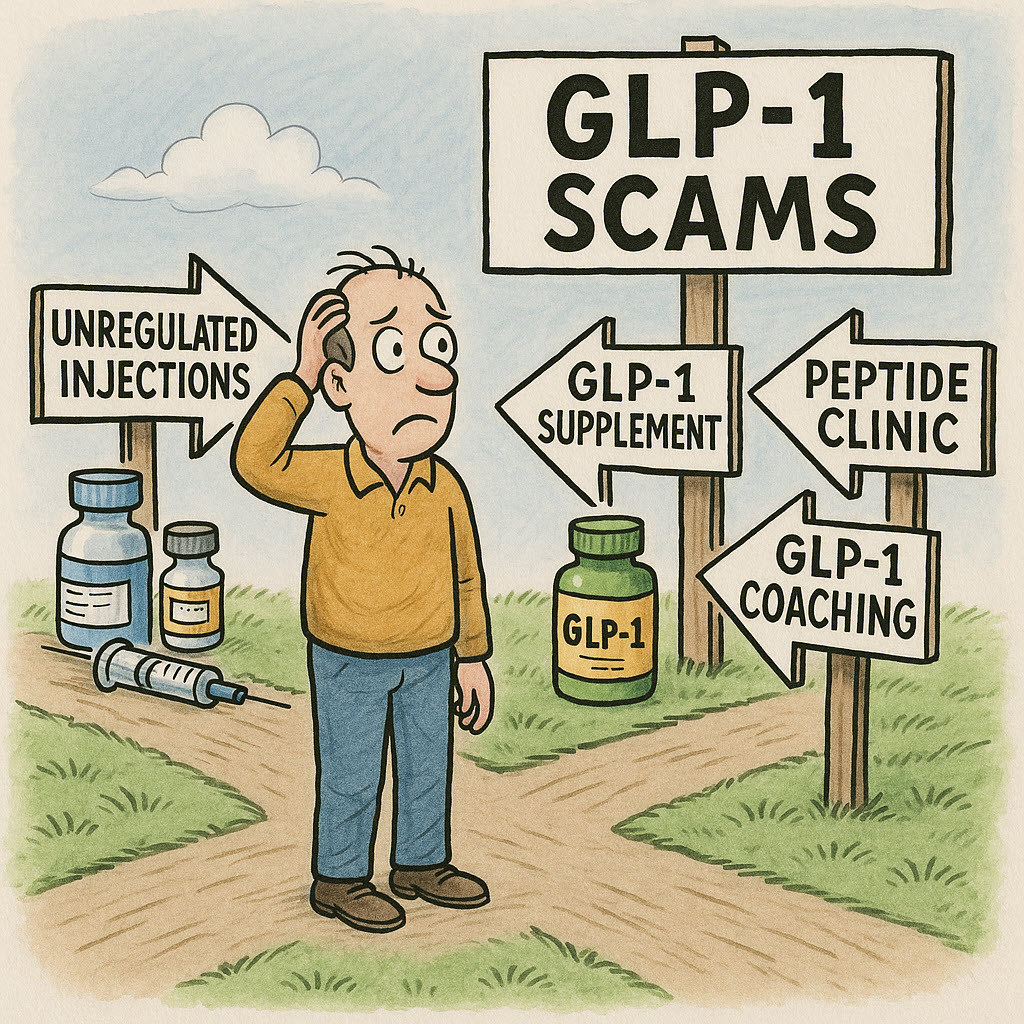
This post is to make alerts consumers to various deceptive practices surrounding GLP-1 medications, which are often used for weight loss and diabetes management. It highlights risks associated with unregulated compounded injections from online clinics, stressing that only FDA-approved drugs from licensed pharmacies are proven safe. The guide also exposes false claims made by oral supplements, sprays, and unapproved peptides that inaccurately market themselves as GLP-1 alternatives or “boosters.” Furthermore, it warns against “GLP-1 coaching” programs lacking medical oversight and the dangers of counterfeit medications sold on social media, emphasizing that such products are often fake or contaminated. Finally, the text identifies misleading “GLP-1 reset” products and unvalidated metabolic tests as additional scams, guiding consumers toward legitimate GLP-1 usage under professional medical care.
The surge in popularity of GLP-1 receptor agonists (like semaglutide and tirzepatide) has sparked a wave of legitimate medical interest, commercial enthusiasm, and unfortunately, a proliferation of scams and pseudoscientific products. Below are some of the common types of scams and deceptive practices exploiting the GLP-1 boom:
🔴 1. Unregulated or Compounded “GLP-1” Injections from Online Clinics
What’s happening: Some telehealth companies and online clinics offer semaglutide or tirzepatide that are compounded in unregulated settings or not semaglutide/tirzepatide at all.
Scam risk: Products may contain incorrect doses, unstable formulations, or different peptides entirely (e.g., research chemicals).
Example scam claims:
“Same as Ozempic, but cheaper!”
“Pharmacy-grade semaglutide—no prescription needed.”
📌 Warning: Only FDA-approved GLP-1 drugs (like Ozempic®, Wegovy®, Mounjaro®) from licensed pharmacies are proven safe and effective.
🔴 2. Oral Supplements or Sprays Claiming to “Mimic” GLP-1
What’s happening: Companies sell over-the-counter pills, powders, or sprays claiming to “boost GLP-1 naturally” or “activate your GLP-1 receptors.”
Scam risk: These products do not contain GLP-1 agonists, and there is no clinical evidence that they produce the same effect as FDA-approved drugs.
Example claims:
“Natural GLP-1 booster”
“Herbal Wegovy alternative”
“Peptide-free weight loss support using GLP-1 science”
📌 Red flag: No supplement can mimic the physiological effects of prescription GLP-1 receptor agonists.
🔴 3. Peptide Clinics Selling “GLP-1-like” Peptides
What’s happening: Peptide clinics advertise non-approved peptides (e.g., tesamorelin, CJC-1295, or unidentified GLP-1 mimetics) for weight loss.
Scam risk: These compounds are often not GLP-1 analogs, lack FDA oversight, and can cause unknown side effects.
Example scams:
“Custom GLP-1 peptide blend”
“GLP-1 enhancer shot”
📌 Note: Even legitimate peptides not approved for obesity/diabetes should not be marketed as GLP-1 equivalents.
🔴 4. “GLP-1 Coaching” Programs with No Medical Oversight
What’s happening: Lifestyle coaching programs brand themselves around GLP-1, promising to “enhance” the drugs’ effects or offer results “without meds.”
Scam risk: While behavioral coaching is valuable, these programs often overpromise and mislead with pseudoscientific claims.
Red flags:
“Our diet boosts your GLP-1 naturally—no need for drugs”
“GLP-1 hacks from biohackers and nutritionists”
📌 Legitimate coaching should not promise results equivalent to pharmacological treatment without clinical backing.
🔴 5. Fake or Counterfeit Ozempic/Wegovy on Social Media or Messaging Apps
What’s happening: Scammers offer “cheap Ozempic” via Instagram, WhatsApp, TikTok, etc., without prescriptions.
Scam risk: These are often completely fake, expired, or contaminated products.
Warning signs:
“DM for semaglutide pens”
“Direct from Canadian pharmacy, no Rx needed”
📌 FDA warning: There are increasing reports of counterfeit semaglutide vials and pens in circulation.
🔴 6. “GLP-1 Reset” Detox Teas, Patches, or Fast Programs
What’s happening: Products branded with language like “GLP-1 reset” or “post-Ozempic detox” claim to restore hormones or maintain weight loss.
Scam risk: These are entirely made-up terms and have no basis in endocrinology.
Example scam phrases:
“GLP-1 Cleanse Kit”
“Ozempic withdrawal support pack”
📌 Real science doesn’t support the need for a “reset” or “cleanse” of GLP-1 pathways.
🔴 7. Misleading Metabolic Tests or Biomarker Panels
What’s happening: Clinics upsell metabolic testing claiming to identify your “GLP-1 response type.”
Scam risk: There’s no validated commercial test for GLP-1 responsiveness via simple blood biomarkers.
Misleading language:
“Find out if you’re a GLP-1 responder before you start”
“Test your peptide metabolism profile”
📌 GLP-1 response depends on clinical criteria—not currently testable with a single lab panel.
What to Look For in Legitimate Use
FDA-approved products: Ozempic, Wegovy, Rybelsus, Mounjaro, Zepbound
Prescribed by licensed healthcare providers
Dispensed through reputable pharmacies
Transparent about side effects, cost, and expected outcomes
📚 References & Warnings
FDA Consumer Warning on Counterfeit Semaglutide: FDA.gov
Obesity Society & Endocrine Society positions on GLP-1 medications
Medscape & NEJM reports on compounded semaglutide safety concerns
Audio Overview (Google NotebookLM)
(16 minutes 35 seconds)

